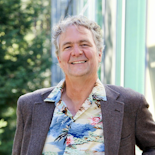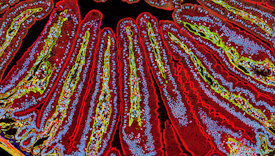
David Haussler, Ph.D.
Distinguished Professor, Department of Biomolecular Engineering and Scientific Director, UC Santa Cruz Genomics Institute, University of California, Santa Cruz
Investigator, Howard Hughes Medical Institute
SFARI Investigator
Website
David Haussler develops statistical, algorithmic and experimental methods to explore molecular function and evolution in the human genome, integrating comparative and high-throughput genomics data to study gene structure, function and regulation. In the 1990s, he pioneered the use in genomics of hidden Markov models, stochastic context-free grammars, neural networks and discriminative kernel methods, building some of the most successful computational methods to find genes in genome sequences and align them to detect evolutionary changes.
As collaborators on the international Human Genome Project, his team created the first publicly available computational assembly of the human genome sequence and posted it on the Internet on July 7, 2000. They subsequently developed the UCSC Genome Browser, a web-based tool that is used extensively in biomedical research and serves virtually all large-scale vertebrate genomics projects including the National Human Genome Research Institute’s Encyclopedia of DNA Elements (ENCODE) project and the National Cancer Institute’s Cancer Genomics Atlas Project, where he served on the steering committee.
More recently, they developed the BRCA Exchange, which, with more than 20,000 variants of the BRCA1 and BRCA2 genes, is the largest public data network for BRCA variants in the world. His group also developed the Treehouse Childhood Cancer Project to enable international comparison of childhood cancer genomes with a special emphasis on pediatric brain cancer.
Haussler’s experimental research focuses on the molecular evolution of DNA, RNA and protein sequences with a special emphasis on neurodevelopment and immunology. His laboratory uses CRISPR, cortical organoid, single cell RNA-seq and other technologies to functionally characterize neurodevelopmental genes that were specifically altered in human evolution. His team develops and shares infrastructure to support both research in, and the clinical application of, precision medicine.
Haussler received his Ph.D. in computer science from the University of Colorado at Boulder. He is a member of the National Academy of Engineering, National Academy of Sciences and the American Academy of Arts and Sciences. He is also a fellow of the American Association for the Advancement of Science and the Association for the Advancement of Artificial Intelligence.
